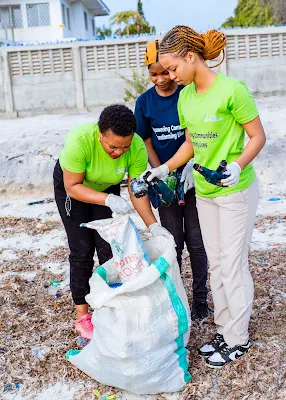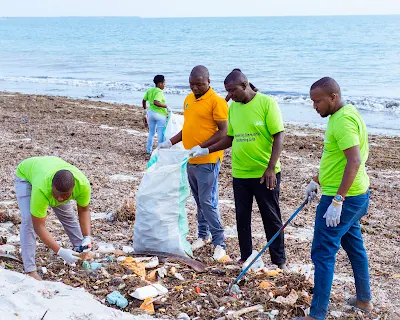Waves of Change: Kidimbwi Beach Unites for a Greener, Safer Future
By Deogratius Temba
Global
Impact Transformation (GIT), in collaboration with the Local Government of
Mbezi Beach and various environmental stakeholders, spearheaded a highly
successful clean-up at Kidimbwi Beach.
The
initiative aimed to restore the coastline’s natural beauty and underscored the
urgent need for environmental stewardship and social responsibility. Through addressing
waste pollution, promoting climate action under Sustainable Development Goal
(SDG) 13, and fostering community unity, the event highlighted the intersection
of environmental sustainability and public safety, including gender-based
violence (GBV) concerns, aligning with SDG 5: Gender Equality.
The
clean-up brought together a diverse group of participants, including local
government leaders, students, environmental advocates, and GIT Champions. Ms.
Sylvia Mkomwa, GIT’s Communication Specialist and General Manager at Calabar
Group of Companies, officially inaugurated the event, emphasising the power of
collective action.
“When
communities unite to protect their environment, we create ripples of change
that extend beyond conservation. A cleaner, safer beach is not just about
aesthetics, it’s about ensuring that everyone, especially women and children,
can enjoy public spaces free from threats and vulnerabilities,” she stated.
Volunteers
engaged in two primary activities waste removal and tree planting. They
collected plastic waste, discarded bottles, and other hazardous materials that
endanger marine life and beachgoers. By eliminating these pollutants, the
initiative improved safety, reduced health risks and rejuvenated the coastal
ecosystem.
In
addition, trees were planted along the beachfront to prevent coastal erosion
and enhance biodiversity. These efforts contribute to long-term environmental
sustainability, ensuring that future generations inherit a healthier planet.
Beyond
its ecological benefits, the clean-up also served as a platform to address
social challenges such as GBV and gender inequality, reinforcing SDG 5: Gender
Equality. Polluted and neglected public spaces can become hotspots for
insecurity, disproportionately affecting women and girls. Unsafe environments
discourage free movement and limit access to recreational and economic
opportunities.
Moreover,
women’s involvement in sustainability initiatives is a crucial step toward
inclusive leadership and social transformation. The active participation of
female leaders, volunteers, and youth in the Kidimbwi Beach Clean-Up
demonstrated that environmental advocacy can also serve as a tool for social
empowerment and gender equality.
Martha
Ng'hambi, the Executive Director of GIT, also highlighted the organization's
commitment to making the environment safe and clean through collaboration with
local government. "At GIT, we believe that protecting the environment goes
hand in hand with ensuring the safety of the community, especially for women
and girls who frequently use public spaces like beaches. Through our partnerships,
we aim to create secure, well-maintained environments where everyone can thrive
without fear," she stated.
The
success of the Kidimbwi Beach Clean-Up serves as a reminder that maintaining
clean and safe coastal areas requires sustained effort. Regular clean-up
campaigns, environmental education programs, and stronger collaborations
between stakeholders are key to preserving these achievements.
As
the event concluded, many participants expressed their commitment to making
environmental conservation a lifestyle, not just a one-time effort. “A clean
environment fosters not only ecological health but also human dignity and
security,” one volunteer remarked.
Intertwining environmental action with social advocacy, the Kidimbwi Beach
Clean-Up exemplifies how local initiatives can drive meaningful, lasting change
one wave at a time














No comments:
Post a Comment